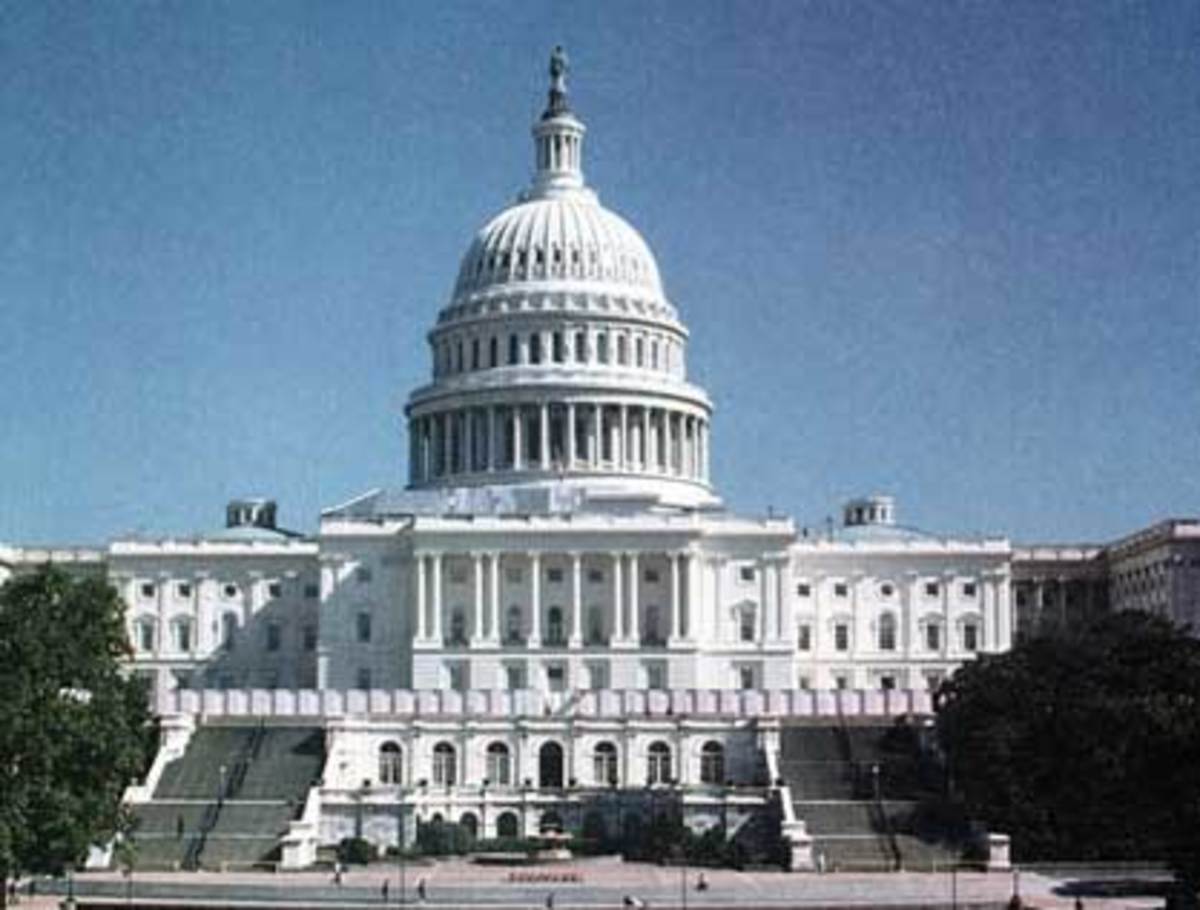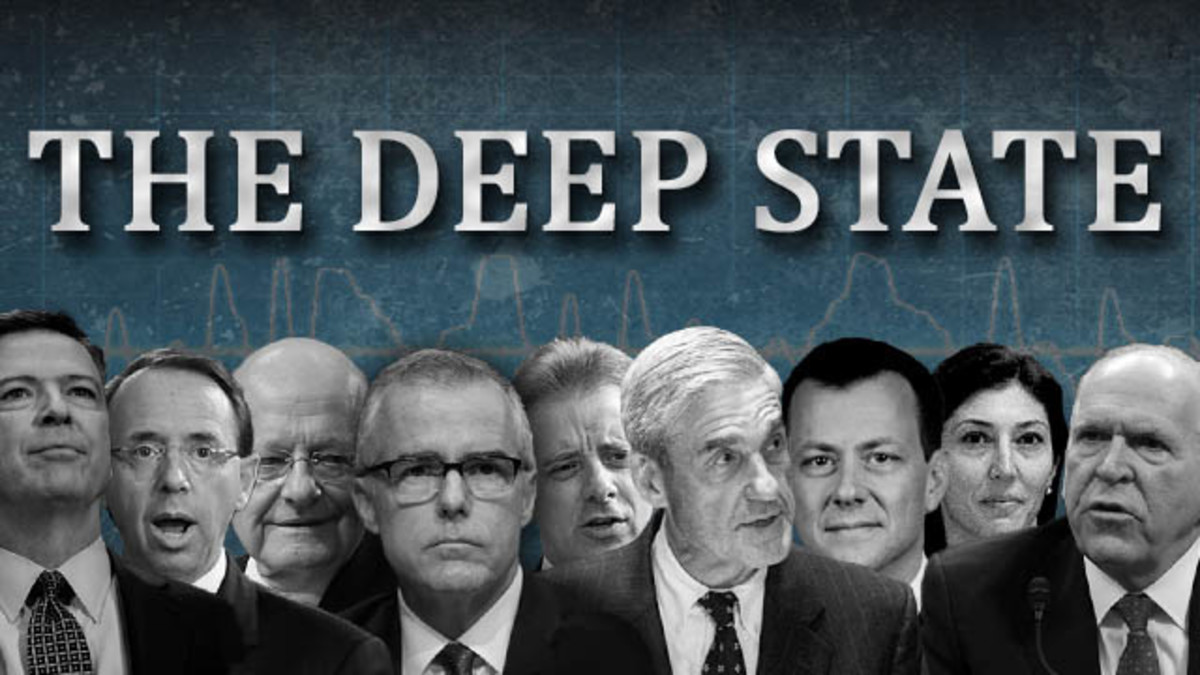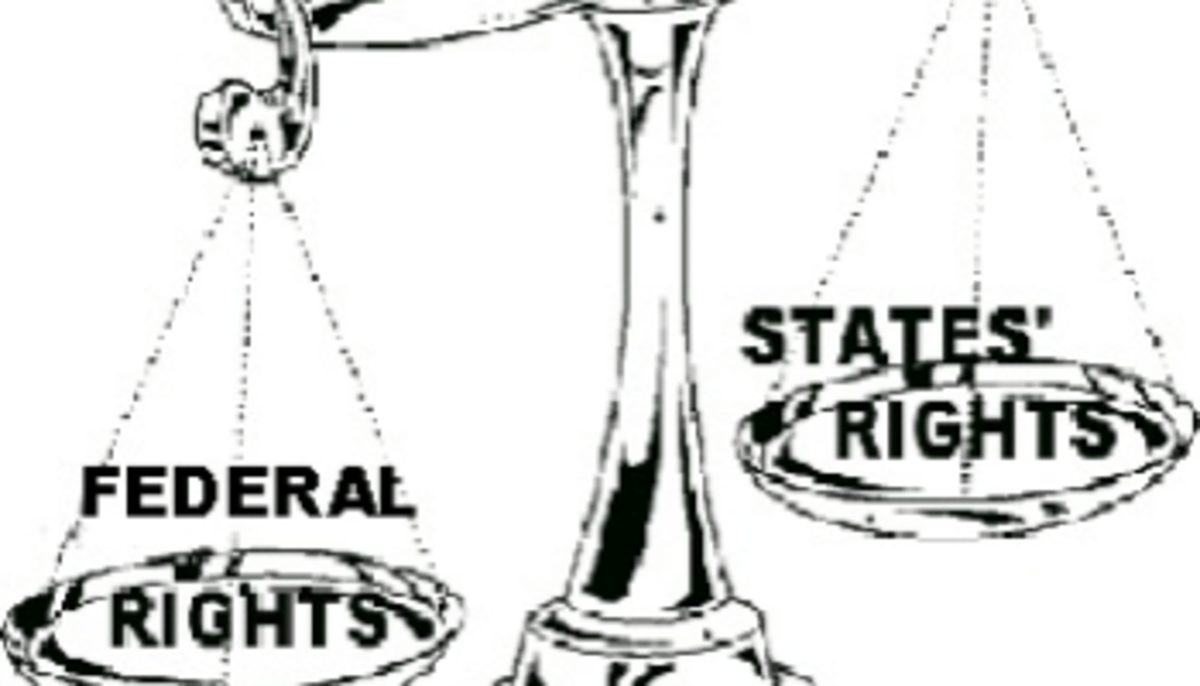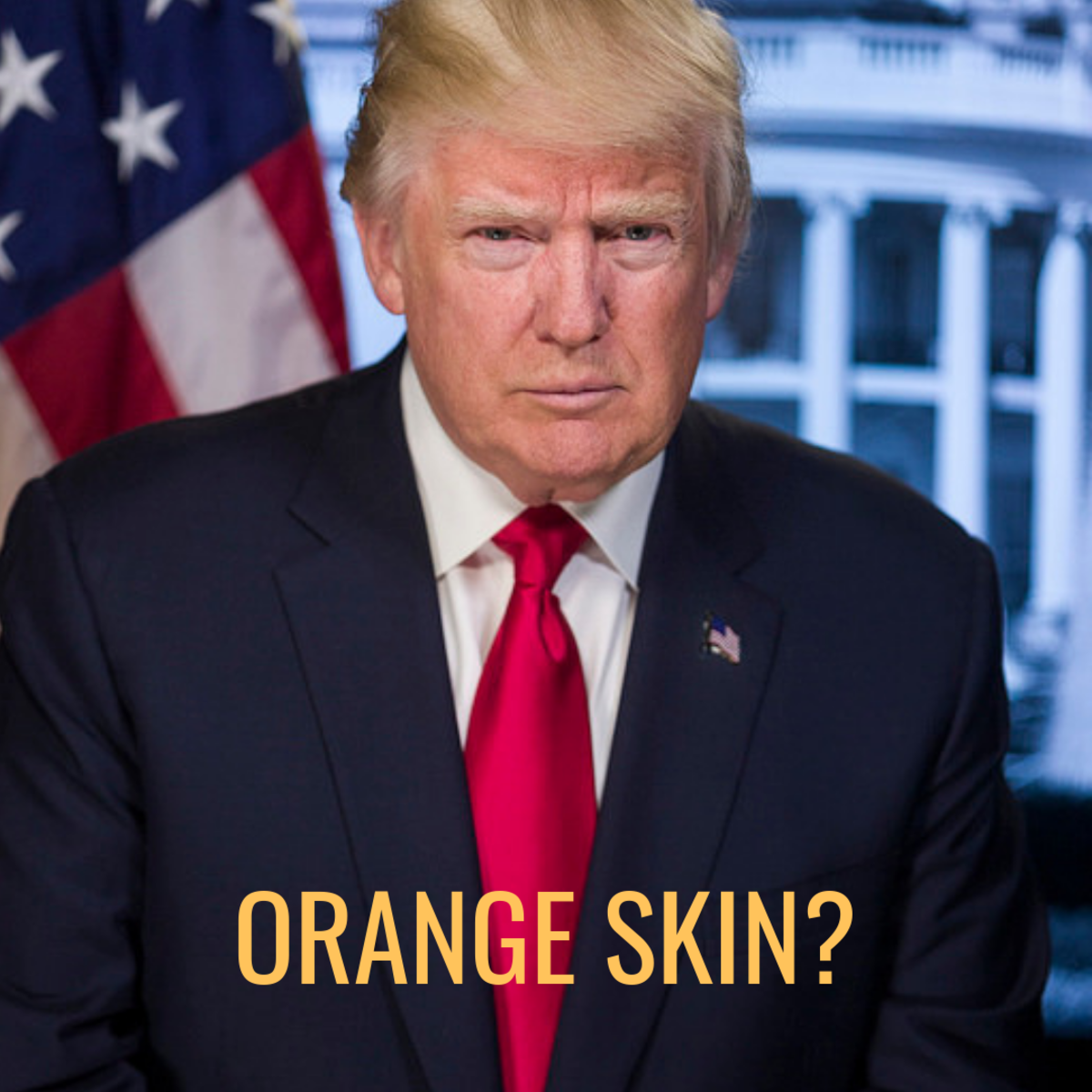On Principle and Pragmatism Vb: What Does Limited Government Really Mean - What is in the Constitution? [101]
What is in the Constitution?
IN THE MAIN, the U.S. Constitution is the operating instructions on how the writers envisioned:
- how the federal government was going to work
- what the relationship between the federal government and state governments was going to be
- what the relationship between the federal government and the citizens was going to be
- what the relationship between the States was going to be
- and, to some degree, what the relationship between the States and the Citizens of other States was going to be
The Constitution is divided into a Preamble and seven Articles; each Article may contain one or more sections. The Preamble lays out the vision, the ideal, the Principle, of the Constitution while the Articles are the operating instructions. Each Article covers a different subject and are:
- Article I - Legislative Branch
- Article II - Executive Branch
- Article III - Judicial Branch
- Article IV - Relationship between States, Citizens between States, extradition, return of Slaves, admission of new States, protection of States, and use of federal troops in States at States request
- Article V - Mechanism for Amending the Constitution
- Article VI - Debts, Treaties, Oaths, and Religious Tests
- Article VII - Ratification
ARTICLE II - EXECUTIVE BRANCH
NO, I DIDN'T forget Article I, I am saving that for last and the discussion on "limited" government.
Article II lays out the duties and responsibilities of the Executive Branch. I will expand my comments to the degree that there are gray areas in the language and not simply mechanical rules and procedures. As it pertains to Article II, there are only two minor phrases that are a little ambiguous and open to interpretation.
In the paragraph that speaks to the power of the President to appointment, with the Advice and Consent of the Senate. all officials in the Executive Branch, but with this proviso ...
"but the Congress may by Law vest the appointment of such inferior Officers, as they think proper, in the President alone, in Courts of Law, and Heads of Departments."
The only reason I bring this one up is its open-ended nature; it really is non-controversial.
One other part of Article II to which I refer became controversial during ratification and that was the oath of office; it failed to contain any reference to God and that upset many Conservatives. The oath read then and it still reads today:
"I do solemnly swear (or affirm) that I will faithfully execute the Office of the President of the United States, and will to the best my Ability, preserve, protect, and defend the Constitution of the United States."
The framers made it a point not to put religious words in the mouth of those taking the oath and left it to them to embellish it as they saw fit.
ARTICLE III - JUDICIAL BRANCH
ARTICLE III CAN be quite interesting in parts. Again, its three Sections are mostly concrete rules, there are a couple of statements that have become rather controversial over the centuries. One such phrase, in Section 2, is "The judicial Power shall extend to all Cases, in Law and Equity, arising under this Constitution, ..." It is the " ... and Equity..." bit that has Conservatives in a tizzy; they feel that the Supreme court has way overstepped its bounds in the application of this part of judicial Power and will be referenced again in the discussion on "limited" government.
Other parts of the original Article III which created quite a stir were those dealing with federal judicial Power over certain cases involving, Citizens, States, and foreign governments. Subsequent Constitutional Amendments modified or eliminated these Powers. Once done, this area has remained rather quiet over time.
ARTICLES IV, V, and VII
THESE THREE ARTICLES are straight-forward and deserve no further comment other than to mention how reprehensible is the "return of slaves" provision in Article IV.
U.S. Constitution, Page 3
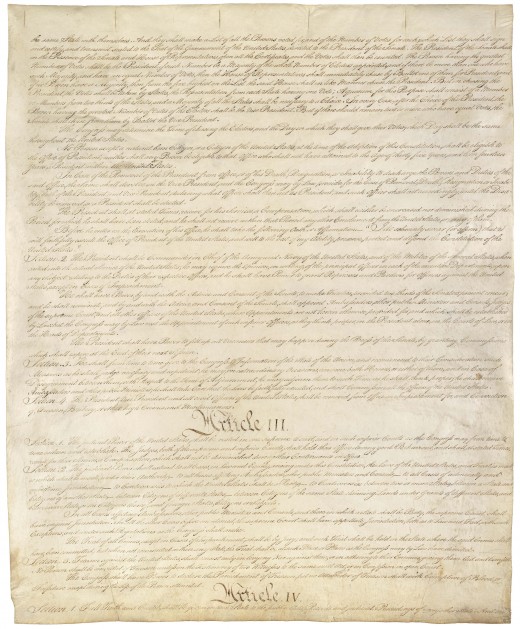
ARTICLE VI
ARTICLE VI IS SIMPLE, deterministic, but very powerful and often forgotten in today's debate. The second paragraph was one of the main sticking points in the debate over ratification and it survived intact; it reads:
"This Constitution, and the Laws of the United States which shall be made in Pursuance thereof; and all Treaties made, or which shall be made, under the Authority of the United States, shall be the Supreme Law of the Land; and the Judges in every State shall be bound thereby, any Thing in the Constitution or Laws of any State to the Contrary notwithstanding."
The underline is my emphasis. This also will come up again in the discussion on "limited" government.
Oh, by the way, the framers had one more thing to say about religion in this Article, they said:
" ... but no religious Test shall ever be required as a Qualification to any Office or public Trust under the United States."
U.S. Constitution, Page 4
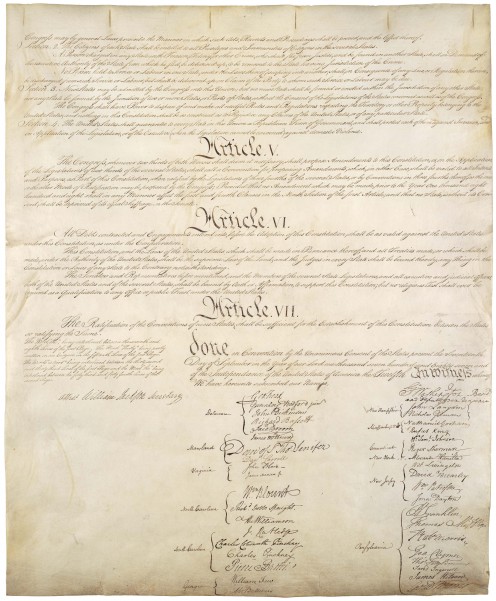
ARTICLE I
THE PIECE D'LA RESISTANCE; the heart of the Constitution. Article I consists of ten Sections; the first seven of which are all deterministic and non-controversial procedures for the operation of the House and the Senate. It is Sections 8, 9, and 10 where things gets interesting, for this is where the limits on government, both State and Federal, are laid out. This where the frames "kicked-the-can-down-the-road", so to speak.
SECTION 8
This section is the most controversial of all of the sections in the Constitution for this is where both Conservatives and Progressives, let alone Supreme Court justices, look to in trying to determine just what "limited" government really means. (I will get to the Bill of Rights in another hub.) First, this section lays out certain "enumerated" powers of the federal government; but non-Conservatives think, for good reason, it goes further. Also note the term "exculsi\ve" is not used as it was in the Articles of Confederation, nor is the term contained in the X Amendment where many wanted it included, but James Madison did not. So, what are the "enumerated" powers (this is copied from Wikipedia and the links should go back to the source?
The Congress shall have power
- To lay and collect Taxes, Duties, Imposts and Excises, to pay the Debts and provide for the common defence[note 1]and general Welfare of the United States; but all Duties, Imposts and Excises shall be uniform throughout the United States; [Note - this is an enumerated power, as general as it reads.]
- To borrow Money on the credit of the United States;
- To regulate Commerce with foreign Nations, and among the several States, and with the Indian Tribes;
- To establish a uniform Rule of Naturalization, and uniform Laws on the subject of Bankruptcies throughout the United States;
- To coin Money, regulate the Value thereof, and of foreign Coin, and fix the Standard of Weights and Measures;
- To provide for the Punishment of counterfeiting the Securities and current coin of the United States;
- To establish Post Offices and post Roads;
- To promote the Progress of Science and useful Arts, by securing for limited Times to Authors and Inventors the exclusive Right to their respective Writings and Discoveries;
- To constitute Tribunals inferior to the supreme Court;
- To define and punish Piracies and Felonies committed on the high Seas, and Offenses against the Law of Nations;
- To declare War, grant Letters of Marque and Reprisal, and make Rules concerning Captures on Land and Water;
- To raise and support Armies, but no Appropriation of Money to that Use shall be for a longer Term than two Years;
- To provide and maintain a Navy;
- To make Rules for the Government and Regulation of the land and naval Forces;
- To provide for calling forth the Militia to execute the Laws of the Union, suppress Insurrections and repel Invasions;
- To provide for organizing, arming, and disciplining, the Militia, and for governing such Part of them as may be employed in the Service of the United States, reserving to the States respectively, the Appointment of the Officers, and the Authority of training the Militia according to the discipline prescribed by Congress;
- To exercise exclusive Legislation in all Cases whatsoever, over such District (not exceeding ten Miles square) as may, by Cession of particular States, and the Acceptance of Congress, become the Seat of the Government of the United States, and to exercise like Authority over all Places purchased by the Consent of the Legislature of the State in which the Same shall be, for the Erection of Forts, Magazines, Arsenals, dock-Yards, and other needful Buildings;—And
What I call the "General" Power otherwise known as the "Necessary and Proper" Clause:
- To make all Laws which shall be necessary and proper for carrying into Execution the foregoing Powers, and all other Powers vested by this Constitution in the Government of the United States, or in any Department or Officer thereof.
SECTION 9
Section 9 lays out the Limits on Congress, notice how short it is:
- The Migration or Importation of such Persons as any of the States now existing shall think proper to admit, shall not be prohibited by the Congress prior to the Year one thousand eight hundred and eight, but a Tax or duty may be imposed on such Importation, not exceeding ten dollars for each Person.
- The Privilege of the Writ of Habeas Corpus shall not be suspended, unless when in Cases of Rebellion or Invasion the public Safety may require it.
- No Bill of Attainder or ex post facto Law shall be passed.
- No Capitation, or other direct, Tax shall be laid, unless in Proportion to the Census or Enumeration herein before directed to be taken.
- No Tax or Duty shall be laid on Articles exported from any State.
- No Preference shall be given by any Regulation of Commerce or Revenue to the Ports of one State over those of another: nor shall Vessels bound to, or from, one State, be obliged to enter, clear, or pay Duties in another.
- No Money shall be drawn from the Treasury, but in Consequence of Appropriations made by Law; and a regular Statement and Account of Receipts and Expenditures of all public Money shall be published from time to time.
- No Title of Nobility shall be granted by the United States: And no Person holding any Office of Profit or Trust under them, shall, without the Consent of the Congress, accept of any present, Emolument, Office, or Title, of any kind whatever, from any King, Prince, or foreign State.
Also see that these prohibitions deal with Citizens, Money, Titles, relations between States; nothing about limits on the federal government over the States.
SECTION 10
This Section sets out the Constitutional limitations on the States:
- No State shall enter into any Treaty, Alliance, or Confederation; grant Letters of Marque and Reprisal; coin Money; emit Bills of Credit; make any Thing but gold and silver Coin a Tender in Payment of Debts; pass any Bill of Attainder, ex post facto Law, or Law impairing the Obligation of Contracts, or grant any Title of Nobility.
- No State shall, without the Consent of the Congress, lay any Imposts or Duties on Imports or Exports, except what may be absolutely necessary for executing it's [sic] inspection Laws: and the net Produce of all Duties and Imposts, laid by any State on Imports or Exports, shall be for the Use of the Treasury of the United States; and all such Laws shall be subject to the Revision and Controul of the Congress.
- No State shall, without the Consent of Congress, lay any Duty of Tonnage, keep Troops, or Ships of War in time of Peace, enter into any Agreement or Compact with another State, or with a foreign Power, or engage in War, unless actually invaded, or in such imminent Danger as will not admit of delay.
The Constitution Needed a Bill of Rights
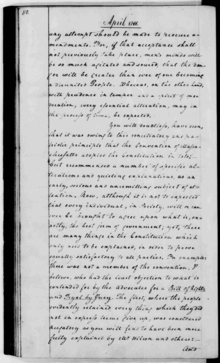
A Quick Detour to the Bill of Rights
THE FIRST TEN AMENDMENTS, commonly known as the Bill of Rights, was put forward by Congress and ratified by the States shortly after ratification of the U.S. Constitution to keep a promise made by Federalists to moderate Anti-Federalists in order to entice them to switch their vote to support the ratification. The Bill of Rights, essentially a creation if James Madison, one of the authors of the Federalist Papers, provided the specification of individual rights those opposed to the Constitution felt were missing from the original document; these were the first nine Amendments.
The last Amendment dealt with the Rights of the States which basically reiterates what is already contained in the Constitution, just said differently, that those Powers not given to the Federal government are reserved to the several States.
Because the X Amendments doesn't really bring anything substantially new to the discussion, I will leave a more detailed analysis to another hub specifically on the Bill of Rights.
THE PHILOSOPHICAL UNDERPINNINGS OF "LIMITED GOVERNMENT"
AS WAS HINTED AT EARLIER, John Locke FRS (29 August 1632 – 28 October 1704), widely known as the Father of Classical Liberalism, is responsible for the concept of "limited government"; and I will argue that it has a different meaning than what is most vocally asserted today. The ideas behind classic liberalism, the rights of the individual over the state, began with the "Glorious Revolution", a civil war, in England shortly before Locke's time but during the life of Thomas Hobbes of Malmesbury (5 April 1588 – 4 December 1679). In developing his philosophy, which resulted in the opus "Leviathan", describing the "perfect" form of government to bring order to society, Hobbes introduced the dual ideas of man originally coming from a "state of nature" and, in order to protect himself from all of the evil in the world (Hobbes was a huge pessimist), the idea that man would leave the state of nature and enter voluntarily into a "contract" to form a dictatorial government (hence the name "Leviathan") whose sole purpose was to establish order in the society. In this contract, the People would give up all rights except one, the right to change the government if it failed in its mission. The question of course is where did the People get these rights they gave up?
The answer lies in the concept of "state of nature". Hobbes, and later Locke, asserts that in the beginning man was in a state of nature where they lived totally unencumbered by any regulation on their lives whatsoever; all activities were permissible up to and including murder and even more horrendous crimes; there simply were no rules limiting the rights of individuals to act any way they wished to act. In fact, anthropologists suggest that in the earliest hunter-gather periods of human and Neanderthal development, that is just the way it was, no rules; no right denied.
Locke agrees with this "state of nature" idea as well with one major exception. Where Hobbes thought people were essentially evil, Locke believed people were basically good; and this difference led Locke to an entirely different idea for a form of government. Instead of one that is all powerful, a Leviathan, his government would be limited, a "limited government" in other words but with the same purpose, to protect society from itself. Locke thought that because people were, for the most part, good and wanted to get a long with each other, there was no need for them to give up many of their rights to the government they consented to form. But why form a government at all, if everybody was good?
Because not everybody is good. Locke was well aware there were nefarious types all around, and plenty of them, ready to take advantage of the good people. As a consequence, the good people of society had to band together, a progressive might say unionize, lol, to form a consensual government designed to protect them from those in society who would hurt them. Notice what the purpose Locke has for government, to put in child-like terms, to protect good people from bad people. It is, fundamentally, no more than that and therefore there is no need for the people to give up all of their rights for this to happen; only enough of them for their government to do its job. But, like Hobbes, if the government fails in its effort or becomes oppressive, then the People reserve the right to change governments and consent to form a new one.
It is this idea of "limited government" which the colonialists brought with them to America. It is this idea of "limited government" which the writers of the Constitution had in mind with creating our historical document. Nowhere in Locke's formulation was consideration given to State's Rights vs Federal Rights; no, his focus was the individuals rights that individuals possessed in a state of nature when there were no governments at all. Locke was thinking of individual liberty when speaking of "limited government". Today, as it did during ratification, the argument morphed into the relationships between governments, state and federal in this case, rather than original liberal concern of individual liberty.
Related and Interesting Hubs
- On Principle and Pragmatism I - U.S. Constitutional ...
OpinionDuck, in one of his comments, invited me to his profile; i am glad I went and would encourage you to go as well. Since I don't have OpinionDuck's permission, I won't copy from the profile but the gist of the opening is that Our opinion is... - On Principle and Pragmatism II - U.S. Constitution R...
Most Americans, including most Conservatives and Tea Party types, as well as Democrats, are not aware how close we came to not having an America at all. Roughly 50% of colonialists wanted something more like the what the European Union is today, exce - On Principles and Pragmatism IIIa - Plato, Washingto...
The foundation for the U.S. Constitution stretch all the way back to 400 B.C. Our Founding Fathers read extensively of the works of Plato and Aristotle. These two great thinkers, among others, had great influence on what our government looks like tod - On Principles and Pragmatism IIIb - Plato, Washingto...
http://myesoteric.hubpages.com/hub/On-Principles-and-Pragmatism-IIIb-Plato-Washington-Adams-Jefferson-and-the-US-Constitution-81 - On Principles and Pragmatism IIIc - Plato, Washingto...
The foundation for the U.S. Constitution stretch all the way back to 400 B.C. Our Founding Fathers read extensively of the works of Plato and Aristotle. These two great thinkers, among others, had great influence on what our government looks like tod - On Principle and Pragmatism IV - What do Plato, Aris...
What are the philosophical underpinnings of the Democratic and Republican political theories; they have very deep roots going back to 400 B.C.E. and two of the most famous thinkers in history. Come read. - On Principles and Pragmatism Va: What Does "Limited"...
This is another in my series on Priciple and Pragmatism which looks at American Constitutional History and tries to apply it to today. This Hub, - Statement of His Holiness the Dalai Lama on the 48th...
10 March 2007 On the occasion of the forty-eighth anniversary of the Tibetan people’s peaceful uprising in Lhasa in 1959, I offer my prayers and tribute to all those Tibetans who have suffered and... - Evolution and Creationism - My Take On Them and How ...
Where do I come from? Why am I here? What is the origin of life? Should we look to science or to the Bible for answers? Or both? Did God create us, or did we evolve from simple sea creatures? Are we related to apes, or especially made in God's image? - Inception and the Philosophy of Pragmatism
For all the interesting science-fiction elements and the exploration of the psycho-physical nature of dreaming Inception is ultimately grounded in basic principles of philosophical pragmatism.


